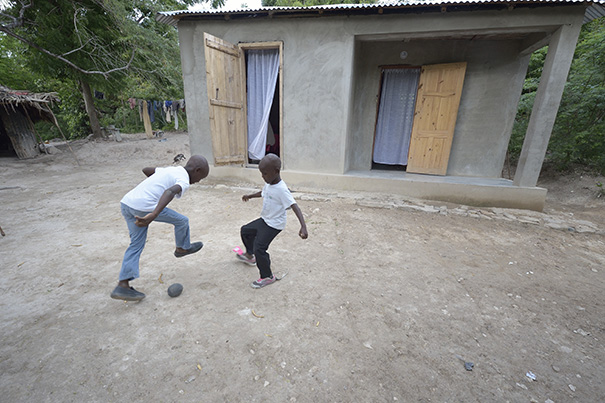
Cherby Cherichel, 9, and his brother Chikendes, 7, play in front of their new home in Lareserve, a village near Jean-Rabel in northwestern Haiti. The family’s previous house was destroyed during Hurricane Matthew in 2016, and Church World Service, a member of the ACT Alliance, helped the family build their sturdy new home.
Photo: Paul Jeffrey / ACT Alliance
When Hurricane Matthew slammed into Haiti one year ago today, it destroyed crops and houses and killed as many as 1600 people throughout the Caribbean island nation. Yet for survivors in communities where the ACT Alliance partners with local groups to support reconstruction, the anguish of the storm is slowing giving way to a more resilient future.
“I feel safe at home now,” said Christiana Herard, a 69-year old woman in Djondgon, a village near Jean-Rabel in northwestern Haiti. “When the hurricane hit here last year our mud walls just shook and then finally crumbled. We fled to the church, and we ended up living there for three months. Then we moved into a temporary shelter under a tarp, but at the end of April we moved into our new house. It has cement walls, so if another storm comes I’m not scared of what will happen.”
Herard’s home was built with support from Church World Service, one of several members of the ACT Alliance that works in Haiti. For years CWS has supported local efforts in the drought-plagued Northwest to help farmers improve soil fertility and crop yields while producing a healthier variety of foods. It’s a long term commitment in a region where poverty and environmental degradation have left communities extremely vulnerable to disasters.
Supporting community-based solutions is slow work, says Margot de Greef, the country representative for CWS, but it yields better results in the long run. She said, “We’re building 81 houses in the Northwest, but they are sturdy and resilient houses. The families that live in them won’t have any problems during the next hurricane.”
In the year since Matthew, the strongest storm to hit Haiti in more than 50 years, CWS has also helped villagers rebuild other components of their lives. In the community of Porrier, for example, CWS is rebuilding an elementary school.
“The storm took away the roof and left all our educational materials ruined. We’ve managed to continue classes in crowded, temporary spaces, but attendance remains down,” said the school’s director, Jean Asseker. “The children were traumatized, and their learning abilities were negatively affected. Their families lost their school books and uniforms. So it’s been a difficult year, but soon we’ll have a new roof thanks to CWS, and we expect that attendance will come back to where it was before. Our students will be proud of their new school.”
As the anniversary comes and goes, CWS and other ACT Alliance members remain committed to accompany the survivors of Matthew as they rebuild their lives. By building back better, by supporting communities as they organize to reduce risks from natural hazards, and by letting the agenda for reconstruction be set by the people themselves, CWS is insuring that Haitian communities can face their difficult future with confidence.
The Rev. Paul Jeffrey is a United Methodist missionary, photographer and writer. One of his roles is providing coverage of emergencies for the ACT Alliance.
